On Intercultural Communication, French War Brides and More: Interview with Author Hilary Kaiser
- SUBSCRIBE
- ALREADY SUBSCRIBED?
BECOME A BONJOUR PARIS MEMBER
Gain full access to our collection of over 5,000 articles and bring the City of Light into your life. Just 60 USD per year.
Find out why you should become a member here.
Sign in
Fill in your credentials below.
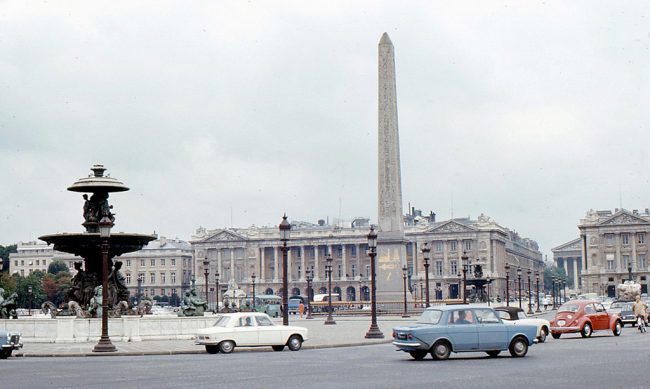
Place de la Concorde, with the American Embassy visible at the far left, in 1968. Photo: Roger W/ Flickr
Hilary Kaiser was born in New York, and raised in the San Francisco Bay area of California, but she has lived mainly in Paris for many years. As an associate professor at the University of Paris, she taught English, American civilization, and intercultural communication and management. Now retired, she is involved in storytelling, playwriting, and spending time with her grandchildren. She is the author of French War Brides: Mademoiselle & the American Soldier and WWII Voices: American GI’s and the French Women Who Married Them, and will be speaking on this topic at Adrian Leeds’ Après Midi meet up on January 9. Kaiser recently took the time to answer Janet Hulstrand’s questions in this exclusive interview for Bonjour Paris.
When did you first come to Paris, what brought you here, and what made you stay?
I first came to Paris in the early 60s with my parents and younger brother. My father was working for the Department of Commerce at the U.S. Embassy on a three-year assignment, and we lived in an apartment building belonging to the Embassy. Following graduation from the American School of Paris, I went off to study in New York and then in Dublin, Ireland, but my dream was to return to Paris on my own and not to live in an American “bubble.” I was able to do this in 1967-68, when I worked for a year in an advertising agency and shared an apartment with a French woman who didn’t speak any English. Returning to the U.S. in August 1968 aboard a student ship, the S.S. Aurelia, I met a French engineering student, a Fulbright scholar who was on his way to Pasadena to get a Master’s degree at Caltech. Since I was off to San Francisco to continue my studies, we decided to meet up again a few months later. The rest is history.
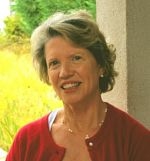
Hilary Kaiser
We returned to Paris a year later, got married and had three sons, all of whom have dual French and American citizenship, just as I do. I was married for 28 years, but am now divorced. Two of my sons, their French wives, and my four Franco-American grandchildren, live in the Paris suburbs, so even though I go back regularly to the San Francisco Bay Area, my permanent home is in Paris. This is because I want to be near my grandchildren, who are still very young, and also because Paris has been my home, off and on, for more than 40 years.
You’ve recently published a new edition of your book, “French War Brides: Mademoiselle and the American Soldier.” How did you come to be interested in this topic? And what is the most interesting thing you learned in the course of researching and writing your book?
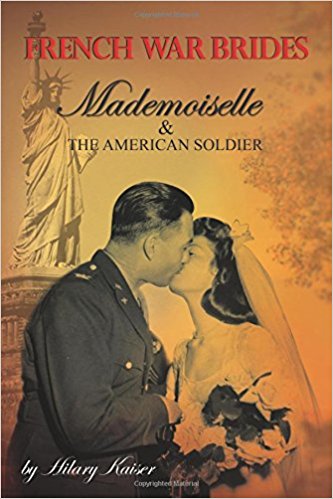 When I first moved to Paris with my parents, our concierge told us a story about how she had had a relationship with a GI and had had a child by him. I later wrote a short story at college about that. Then in 1992 or so, I was collecting oral histories of U.S. veterans in France, many of whom were married to French women. This sparked my interest in the subject of war brides, and I later interviewed two of these women. My first real interview of a French war bride, though, was of the mother of an American friend living in Paris, who was visiting from Kentucky.
When I first moved to Paris with my parents, our concierge told us a story about how she had had a relationship with a GI and had had a child by him. I later wrote a short story at college about that. Then in 1992 or so, I was collecting oral histories of U.S. veterans in France, many of whom were married to French women. This sparked my interest in the subject of war brides, and I later interviewed two of these women. My first real interview of a French war bride, though, was of the mother of an American friend living in Paris, who was visiting from Kentucky.
There are several interesting things I learned while researching my book and doing the interviews. First, there were about as many French war brides of U.S. soldiers after WWI as after WWII, and the brides of WWI often paved the way to assimilation for their younger counterparts. Another interesting aspect of my book was learning about the difficulties the brides faced settling in America, and how their experiences were practically the mirror image of those of us who married Frenchmen and moved to France later on.
You were on the faculty at the University of Paris, where you taught Intercultural Communication and Management, and your website describes you as, among other things, a cross-cultural trainer. What does that mean, and what kind of work do you do in this regard? What does this area cover, and what was your academic area of expertise?
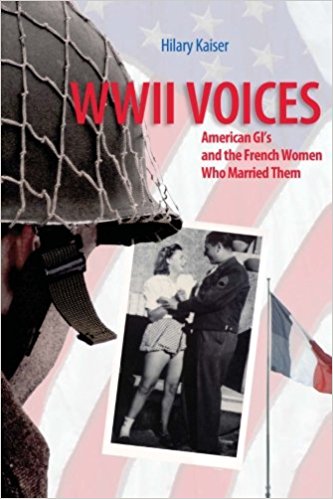 Ironically, I have a BA in French from an American university and a Master’s and PhD in American studies from the University of Paris. I taught English and American civilization here in France, both at the secondary and college levels, before getting into the field of intercultural communication. I do not have a degree in the field, but I attended the Summer Institute of Intercultural Communication in Portland, Oregon, for two summers in a row and took part in many workshops and seminars on the subject, mostly through SIETAR. Because I was teaching French business students, my university was delighted when I suggested offering a course in intercultural communication and management: this was about 20 years ago, and the subject was new at the time. Nowadays, it’s taught in many master’s programs in French universities and business schools. I retired from teaching about 10 years ago, but I still work from time to time as an independent trainer for several relocation firms having corporate clients. As trainers, we provide cultural orientation, country and region-specific information, and coaching, to expatriate employees and their families. My particular field of expertise is living and working in both France and the U.S.
Ironically, I have a BA in French from an American university and a Master’s and PhD in American studies from the University of Paris. I taught English and American civilization here in France, both at the secondary and college levels, before getting into the field of intercultural communication. I do not have a degree in the field, but I attended the Summer Institute of Intercultural Communication in Portland, Oregon, for two summers in a row and took part in many workshops and seminars on the subject, mostly through SIETAR. Because I was teaching French business students, my university was delighted when I suggested offering a course in intercultural communication and management: this was about 20 years ago, and the subject was new at the time. Nowadays, it’s taught in many master’s programs in French universities and business schools. I retired from teaching about 10 years ago, but I still work from time to time as an independent trainer for several relocation firms having corporate clients. As trainers, we provide cultural orientation, country and region-specific information, and coaching, to expatriate employees and their families. My particular field of expertise is living and working in both France and the U.S.
What do you think is the most difficult thing for Americans to understand about the French, and for the French to understand about Americans?
That’s a hard question to answer, especially as I can’t really limit myself to just one thing. The French on the whole are more subtle, more “3e degree” than Americans, who tend to believe what they hear, and to have a “what you say is what you mean” type of mentality. This can often cause conflict. Similarly, Americans tend to be optimistic and “can-do,” and American schooling stresses children’s “self-esteem,” whereas the French, due to their schooling and upbringing, tend to think you can always do better: they have a more measured, even cynical, outlook on life.
What do you miss most about France when you are in the U.S., and what do you miss most about the U.S. when you are in France?
I speak fluent French and when I’m in the U.S. I miss speaking it on a daily basis, but on the other hand, it’s very comfortable speaking my native tongue in the U.S. and just blending in. And how great it is not to have someone comment on my “charming” accent all the time! While in the U.S., I also miss dining in quaint French restaurants and buying good, but inexpensive, wine almost everywhere. When I’m in Paris, I miss the ocean and the sun of California and the smiles on people’s faces. Unfortunately, if you smile at someone you don’t know here in Paris, it’s considered a “come-on,” and could get you into trouble.
What are you working on now?
In the last seven years or so, I’ve discovered playwriting, which I really love. I’ve written four full-length plays and about 20 short ones. My first full-length play incorporates some of the stories that appeared in my books on U.S. veterans and French war brides, but they’re fictionalized. Most of my plays have a U.S.-France connection in some way. In addition to writing another play, I’m currently working on a novel that is inspired by the diary of my paternal grandmother, a Philadelphia socialite who died long before I was born.
Purchase Hilary’s books on Amazon below:
Lead photo credit : Place de la Concorde, with the American Embassy visible at the far left, in 1968. Photo: Roger W/ Flickr
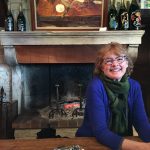
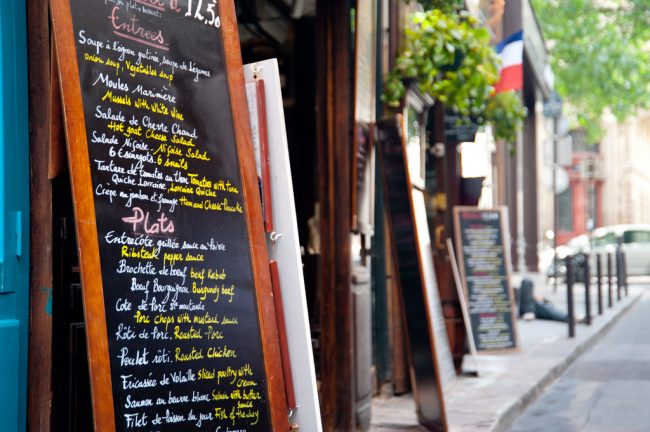


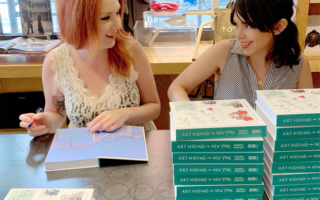
REPLY